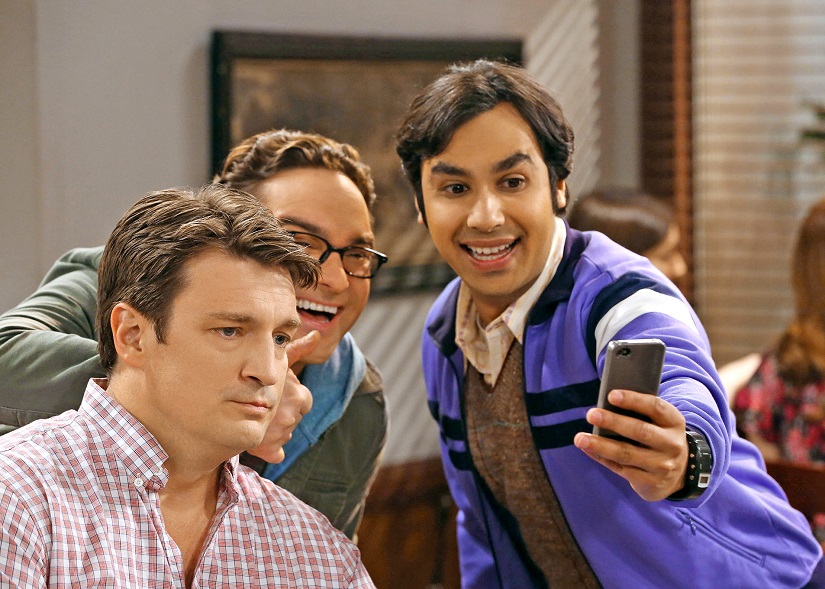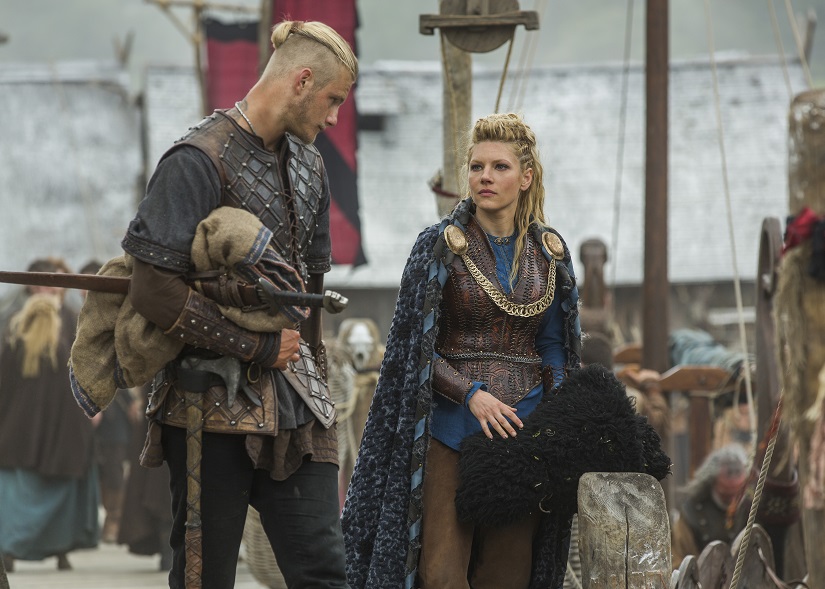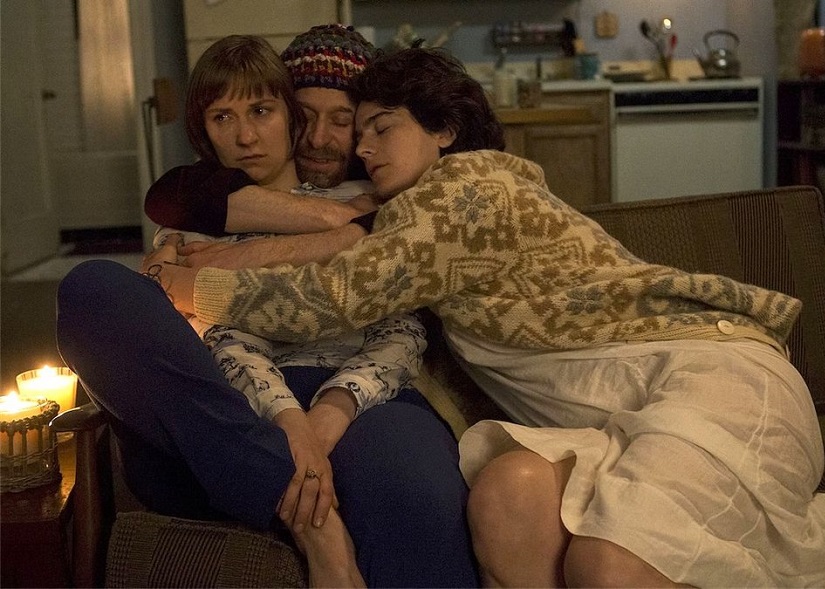This Week in TV is a weekly feature reviewing the best, worst and most interesting episodes of television from the past seven days. The plan is to cover a wide variety of shows, but not always the same ones each week, so let us know in the comments which ones you’d particularly like to read about. This week sees the Clown Prince Of Crime (possibly) make his entrance in Gotham, a death in the family in The Big Bang Theory, Vikings set sail for England and Hannah returning home to find her life in ruins once again in Girls.
Gotham – ‘The Blind Fortune Teller’. Gotham feels on the verge of going full circle into becoming a parody of itself. Afflicted from the beginning with a case of severe tonal discord, the show seems to have doubled down on the lunacy with every passing week while intermittently still trying to engage viewers with what it tries to pass off as serious drama. The cases of the week are often grizzly affairs, yet interspersed with moments of baffling ridiculousness such as Gordon deciding the best way to locate a missing person is to… release and follow their pet snake? True, plots set in circuses have always dabbled in the outlandish even in more serious-minded shows, but Gotham has so comprehensively failed to establish the kind of show it wants to be, bouncing between ploddingly uninventive procedural and overwrought and underdeveloped comic book series, that such inexplicable flourishes just feel like the latest of far too many dunderheaded narrative choices.
The characters, too, seem to be getting more exaggerated. Oswald Cobblepot may have started out as a mummy’s boy, but was also a devious criminal mastermind. Now he’s so in thrall to her that he’ll willfully indulge her delusions even if it means undermining his hard-won standing in the underworld. Fish Mooney, never knowingly understated, is now delivering speeches while standing on top of a kneeling man. Catwoman and Ivy are reduced to temporary stylists for Barbara, who must surely rank as one of the most pointless characters in television history. As for the love-in between Gordon and Dr. Thompson, their reactions to everything are so loopily broad and out of nowhere (Dr. Thompson is suddenly really, really excited about solving a cryptic clue from a psychic, because why not?) that you have to wonder if the cast have finally realised what a complete mess their show is and decided to ham up every clunky exchange just to see what they can get away with.
It’s appropriate, then, that this is the point the show chooses to introduce its Joker, or at least heavily hint that way without outright declaring it, a child called Jerome who is just as schizophrenic as the show he’s been plonked into. To his credit, the young actor portraying him, Cameron Monaghan, is fantastic, overacting in just the right way – as opposed to the show’s insufferable takes on Edward Nigma and Harvey Dent, for instance – and snapping between Nicholson and Ledger with palpably unhinged ferocity. I don’t particularly like the idea of the character being given one conclusive origin story (especially one so mundane, with yet more mother issues) but Monaghan plays his cards with stupendous relish, immediately becoming the most interesting player in the show’s overblown roster. Hopefully there’ll be more of him to come, because god knows it’s becoming increasingly difficult to pick out anything else to look forward to in a show gradually sinking under its own weight.
The Big Bang Theory – “The Comic Book Store Regeneration”. When it’s on form, I’m actually a fan of Big Bang. Its characters have been intelligently developed over the years and the writers have steadily pushed out the uglier elements from the show’s early days. True, it still has the bad habit of laughing at its characters rather than with them, but there’s a lot more sincere affection for them than there used to be and the addition of Amy and Bernadette introduced a more balanced female perspective that offered new sources of comedy whilst forcing Penny to develop into a more distinct character than ‘hot blonde across the hall’. Prior to that, the only alternate female voice – literally – was Howard’s mother, a shrill and insufferable Jewish stereotype whose off-screen presence was used almost exclusively to make uncomfortable jokes about her weight and hygiene. Despite the faultless commitment of actress Carol Ann Susi, the character was never allowed to develop beyond those problematic roots.
What a shame that was, because it is difficult not to reflect on how much more Susi deserved out of her swansong role following a long and successful career in television and on stage. Her passing in November of last year meant Big Bang was to finally lose the difficult Mrs Wolowitz under the worst possible circumstances and without the chance to grow the character into someone more deserving of the talent behind her voice. In-keeping with a season which has struggled to reach anything approaching the highs of last year, ‘The Comic Book Store Regeneration’ was for the most part a bewilderingly flat half-hour that held back its major development – Mrs Wolowitz’ death – until the final minutes, even though the material leading up to it felt like the most tedious kind of padding (Nathan Fillion’s utterly pointless cameo) and retreading barren ground (Howard’s feud with Stewart). While the announcement of the death was delivered in a strangely graceless manner – Howard wandering around aimlessly for a moment before declaring “My mom died” out of nowhere – the final scene at least provided a sincere tribute to the character and Suzi by proxy, with Sheldon’s sweet consolation to his grieving friend an effective nod to how the character has grown. Hopefully next week’s episode, ‘The Intimacy Acceleration’, will continue to explore Mrs Wolowitz and Carol Ann Suzi’s legacy on the show, because while sweet enough in its limited way, leaving the tribute until the final five minutes felt utterly inadequate as recognition for one of the show’s most enduring performers, for better (the actress) or worse (the character).
Vikings – “Mercenary”. I haven’t seen a lot of Vikings, but the show has slowly grown into a bonefide ratings and critical hit over its two preceding seasons. At the end of last season, protagonist Ragnar became king by outmanoeuvering and killing the deceitful Horik. Ragnar, a former farmer, is at once a natural leader and an outsider within his own people: a man of foresight and peace, whose first interest is finding somewhere to settle down and make a home even while enjoying his obvious talent for leadership and combat. It’s not especially unusual for a historical drama to show a character caught between his civilised intellect and more primal urges encouraged by the society around him, but Vikings has done a terrific job establishing a world echoing its hero’s conflict: on the verge of civilisation, yet not quite ready to abandon the rule of the sword.
That dichotomy was at the core of the drama in ‘Mercenary’, Vikings‘ third season premiere. Having negotiated a settlement with King Ecbert Wessex (read: England) that would seemingly guarantee peaceful co-existence between their two peoples, Ragnar discovers Ecbert wishes to add an addendum to their deal, using the Vikings’ combat prowess to defeat his rivals and secure his dominion of the kingdom. Ragnar and his men reluctantly agree, leading to a climactic battle in which they storm one of the two armies which have flanked their longboats on either side of a bay. It’s a well-staged sequence, if a little lacking in momentum due to the ease with which the Vikings repel the onslaught of arrows sent their way before ploughing fearlessly into the opposing army, which offers little serious resistance. It helps that the scene comes at the end of an episode a little too dialogue-heavy for its own good, laying out the key dramatic notes for the season ahead (as all premieres must) but falling back too often on telling rather than showing. Still, it’s solid enough stuff and Floki’s total inability to handle how kind and loving his wife is was a fantastically funny break from the seriousness elsewhere. It may have felt a little leaden-footed on its own, but the groundwork laid in Mercenary was promising enough to offer encouraging signs for the state of the season ahead.
Girls – “Sit In”. Hannah Horvath’s continual dipping in and out of existential despair is a well Girls has gone to time and time again, yet one that never seems to run dry of fantastic material. Happy Hannah is mostly fun when we can see her setting up her own inevitable downfall, but Lena Dunham seems to take perverse delight in making every one of those falls back down to earth even more shameful and rooted in blind self-absorbtion than the last. When Marnie – Marnie! – is able to see the situation clearly enough to offer sensible advice, it’s probably best to admit you’ve probably made a huge mistake. Having abandoned her writing course in Iowa after alienating every single one of her (admittedly unpleasant) fellow students, Hannah returns home to find boyfriend Adam shacked up in her flat with new girlfriend Mimi-Rose Howard, or as she is delightfully described, “a girl’s name and a boy’s name with a flower stuck in the middle”. Her old friends don’t seem all that delighted to see her either, having felt that she’d abandoned them just as they were on the cusp of rekindling their lives and friendship. As if it couldn’t get any worse, Mimi-Rose seems to be exactly the kind of honestly reflective, if undeniably pretentious, creative spirit Hannah wishes she could be.
‘Sit In’ takes place entirely within Hannah’s flat, with almost the entire main cast of characters turning up in sequence. Jessa and Shosh go first, with Jessa taking no time at all to insult Adam for making Marnie his first choice call and reminding everyone why a well-delivered ‘twat’ can be one of the funniest single words in the English language (see also: Red Dwarf). It’s a lovely example of everything Girls does so well at its best, at once mercilessly humiliating Hannah for laughs – oh, that bucket – while offering just enough sympathy for the insecurities and doubts of this most unintentionally self-destructive of characters to not feel vindictive. The other characters were there to either remind Hannah of how she’d let them down or offer amusingly overbearing amounts of sympathy for the breakdown of her relationship with Adam (you’d think the series had relocated to England given the amount of tea on offer, itself subject to a great piece of Horvath incredulity), with inspired one-liners coming thick and fast (“This isn’t one of your more convincing fake showers!”) and some fabulous visual gags, such as the uncomfortably extended hug-turned-weirdly-sexual-something in the screencap above. Still, if all else fails, at least Hannah can take comfort from knowing she’s now got Marnie as a soulmate. Right…?



